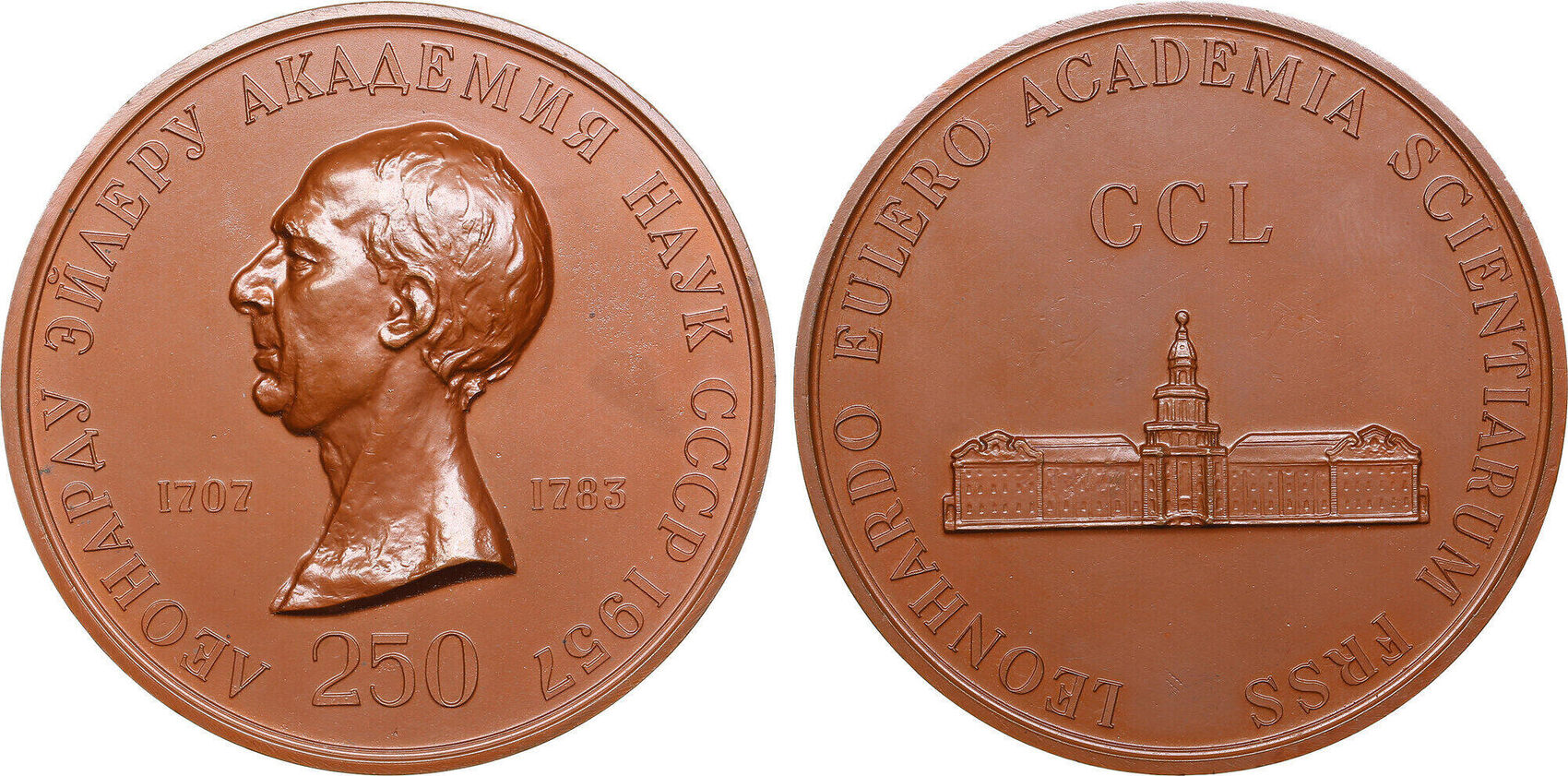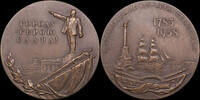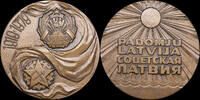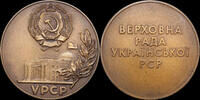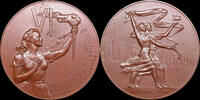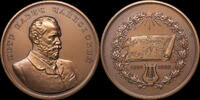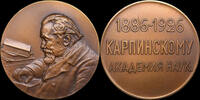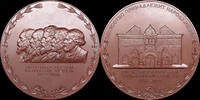MA-号码: 502202090
USSR / Russia medal - 250 years since the birth of Leonhard Euler, 1957, Rare! UNC
Russia - USSR medal 250th anniversary of the birth of L. Euler, 1957
Shkurko, Salykov 134. UNC Diameter 60mm. 136g. Tompac. Mintage unknown. G.S. Shklovsky.
Leonhard Euler: The Mathematical Titan
Leonhard Euler, born on April 15, 1707, in Basel, Switzerland, is often regarded as one of the greatest mathematicians in history. His contributions to mathematics, physics, and engineering are so profound that they continue to influence these fields centuries later.
Early Life and Education:
Euler's father, a Calvinist pastor, initially intended for him to follow in his footsteps. However, Euler's mathematical talent was evident early on. He studied at the University of Basel under Johann Bernoulli, one of the leading mathematicians of the time, and quickly surpassed his peers in mathematical prowess.
Career and Contributions:
Euler's career took him to St. Petersburg in Russia, where he became a member of the St. Petersburg Academy of Sciences. Later, he moved to Berlin under the patronage of Frederick the Great before returning to Russia. Here are some of his monumental contributions:
Number Theory: Euler made significant advances in number theory, including the concept of Euler's totient function and the proof of Fermat's Last Theorem for specific cases. His work on prime numbers, particularly the distribution of primes, laid groundwork for future mathematicians.
Graph Theory: Euler's solution to the Seven Bridges of Königsberg problem is considered the birth of graph theory. This problem, which asked if it was possible to walk through the city crossing each bridge exactly once, led to the concept of Eulerian paths and circuits.
Mathematical Notation: Euler introduced much of the mathematical notation we use today, including the use of e for the base of natural logarithms, i for the imaginary unit, and f(x) for functions.
Calculus: He expanded the field of calculus, developing methods for solving differential equations and integral calculus. His work on infinite series, including the famous equation e^(ix) = cos(x) + isin(x)*, known as Euler's identity, is often cited as the most beautiful in mathematics.
Physics and Astronomy: Euler's work in physics included fluid dynamics, where he formulated Euler's equations for the motion of incompressible fluids. In astronomy, he contributed to the understanding of celestial mechanics, including lunar theory.
Legacy:
Euler's productivity was staggering; he published over 800 books and papers, many of which were published posthumously. His work was not just about solving problems but also about laying the foundation for future mathematical and scientific inquiry. His approach to mathematics was both practical and theoretical, making him a pioneer in applied mathematics.
Euler's life was not without challenges; he became nearly blind in his later years, yet his productivity did not wane. His ability to continue working despite his visual impairment is a testament to his intellectual vigor.
Leonhard Euler died on September 18, 1783, leaving behind a legacy that continues to be explored and expanded upon. His work remains fundamental in modern mathematics, physics, and engineering, making him a true titan of science whose influence is timeless.
Shkurko, Salykov 134. UNC Diameter 60mm. 136g. Tompac. Mintage unknown. G.S. Shklovsky.
Leonhard Euler: The Mathematical Titan
Leonhard Euler, born on April 15, 1707, in Basel, Switzerland, is often regarded as one of the greatest mathematicians in history. His contributions to mathematics, physics, and engineering are so profound that they continue to influence these fields centuries later.
Early Life and Education:
Euler's father, a Calvinist pastor, initially intended for him to follow in his footsteps. However, Euler's mathematical talent was evident early on. He studied at the University of Basel under Johann Bernoulli, one of the leading mathematicians of the time, and quickly surpassed his peers in mathematical prowess.
Career and Contributions:
Euler's career took him to St. Petersburg in Russia, where he became a member of the St. Petersburg Academy of Sciences. Later, he moved to Berlin under the patronage of Frederick the Great before returning to Russia. Here are some of his monumental contributions:
Number Theory: Euler made significant advances in number theory, including the concept of Euler's totient function and the proof of Fermat's Last Theorem for specific cases. His work on prime numbers, particularly the distribution of primes, laid groundwork for future mathematicians.
Graph Theory: Euler's solution to the Seven Bridges of Königsberg problem is considered the birth of graph theory. This problem, which asked if it was possible to walk through the city crossing each bridge exactly once, led to the concept of Eulerian paths and circuits.
Mathematical Notation: Euler introduced much of the mathematical notation we use today, including the use of e for the base of natural logarithms, i for the imaginary unit, and f(x) for functions.
Calculus: He expanded the field of calculus, developing methods for solving differential equations and integral calculus. His work on infinite series, including the famous equation e^(ix) = cos(x) + isin(x)*, known as Euler's identity, is often cited as the most beautiful in mathematics.
Physics and Astronomy: Euler's work in physics included fluid dynamics, where he formulated Euler's equations for the motion of incompressible fluids. In astronomy, he contributed to the understanding of celestial mechanics, including lunar theory.
Legacy:
Euler's productivity was staggering; he published over 800 books and papers, many of which were published posthumously. His work was not just about solving problems but also about laying the foundation for future mathematical and scientific inquiry. His approach to mathematics was both practical and theoretical, making him a pioneer in applied mathematics.
Euler's life was not without challenges; he became nearly blind in his later years, yet his productivity did not wane. His ability to continue working despite his visual impairment is a testament to his intellectual vigor.
Leonhard Euler died on September 18, 1783, leaving behind a legacy that continues to be explored and expanded upon. His work remains fundamental in modern mathematics, physics, and engineering, making him a true titan of science whose influence is timeless.
Info / FAQ
| Shipping fees | ||||
|---|---|---|---|---|
| 8.32 元 to 415.83 元 | 415.83 元 to 1,663.33 元 | 1,663.33 元 to 4,158.32 元 | over 4,158.32 元 | |
| China | 99.80 元 | n/a | n/a | n/a |
| Germany | 41.58 元 | 41.58 元 | 41.58 元 | 124.75 元 |
| Estonia | 41.58 元 | 41.58 元 | 41.58 元 | 99.80 元 |
| United Kingdom | 41.58 元 | 41.58 元 | 41.58 元 | 207.92 元 |
| United States | 41.58 元 | 41.58 元 | 41.58 元 | 332.67 元 |
| European Union | 41.58 元 | 41.58 元 | 41.58 元 | 207.92 元 |
| World | 99.80 元 | 124.75 元 | 831.66 元 | 831.66 元 |
Information
Online orders are welcome as always and will be shipped directly.
|
商店主页 | 0购物车 | 使用条件 | 联系 | MA 使用条件 | 隐私声明 | 保证期 | MA-Shops 新商品 Copyright ® 2001-2025, MA-SHOPS Coins All Rights Reserved. Designated trademarks and brands are the property of their respective owners. |
 Buy coins with warranty
Buy coins with warranty


